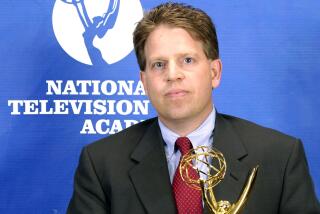Errol Morris creates ambitious documentary series for ESPN

In a filmmaking career spanning nearly 40 years, Errol Morris has helped liberate a Texas man accused of murder, re-examined the photographs of Abu Ghraib and put the screws to former Secretary of Defense Robert McNamara.
Now he can add another notch to that illustrious resume: chronicler of Mr. Met.
The ignoble New York Mets mascot — along with a cultish electric football league, the intense owner of the racehorse California Chrome and several other colorful subjects — form the spine of a new series of short-form documentaries that Morris has conceived and directed for ESPN.
On Tuesday the network is expected to announce that it has commissioned pieces from the Oscar winner that will be grouped under the banner “It’s Not Crazy, It’s Sports.”
The shorts run as long as 24 minutes and collectively tally approximately to 100 minutes, the length of a feature film. They will air on the network in a block on Sunday, then roll out one at a time throughout the week on the ESPN-owned journalism site Grantland.
“There are, among other things, stories of obsession,” Morris said in an interview. “And those have always fascinated me.”
In “The Subterranean Stadium,” Morris focuses on John DiCarlo and his family and friends, who have participated in a long-standing electric football league in a tricked-out basement in Rochester, N.Y. “It’s almost like moving chess — you make the wrong move, you’re cooked,” DiCarlo, the league’s commissioner, says in the film, to some incredulity from Morris.
Sports memorabilia owners are documented in “Most Valuable Whatever,” examining the psyche of people who can’t contemplate life without owning Ty Cobb’s dentures.
California Chrome owner Steve Coburn — known for his post-Belmont Stakes rant about a supposedly unfair aspect of the Triple Crown season — is seen in “Chrome,” albeit in a different, more favorable light than viewers of the 2014 race will recall.
And in “Being Mr. Met,” Morris visits with A.J. Mass, a lifelong fan who “played the character” at the team’s former Shea Stadium from 1994 to 1997. Mass is seen at home sewing the costume and describing the challenges, physical and existential, of embodying the large-meloned mascot. Groin-smacking is an issue, but so is the Hegelian dilemma of occupying the space between player and fan.
And forging a viable identity is a challenge. “Most people,” Mass says, “don’t even realize there’s a mister inside Mr. Met.”
Morris said he believed the stories were only partly about the games and players at hand.
“The fact that they’re about sports is helpful, but I was attracted to them for other reasons,” he said. “What’s it like to still feel like you’re Mr. Met even though you can’t wear the uniform anymore? What’s it like to buy teeth from the same person at Sotheby’s who sells Vermeers?”
“It’s Not Crazy” is the latest example of directors looking outside traditional feature financing and distribution to bring their work to the public eye. ESPN, via its original-content banner Exit 31, has a number of other shorts series with the likes of Spike Lee and Eva Longoria.
ESPN initially imagined that the Oscar winner would direct just one film and then godfather the others, as Lee and Longoria have. But Morris expressed an interest in helming the full half-dozen, so ESPN hired him for all of them, in a kind of documentary version of Cary Fukunaga and “True Detective.”
(The Morris series shares a name with a commercial the filmmaker directed some time back for the network but is not otherwise related. The shorts efforts are also separate from the well-known “30 for 30” franchise, which pairs director and subject in a more traditional feature model.)
Daniel Silver, who oversees shorts for ESPN Films, said he believed the stories Morris tells in the series are akin to “Fast, Cheap and Out of Control,” the director’s hit 1997 film that looked at oddball professions like lion tamer and robotic specialist. “If we can do ‘Subterranean Stadium’ and make it feel like another chapter in that movie, that’s a win,” Silver said.
Morris, who became a critical darling for his wrongful-conviction tale “The Thin Blue Line” in 1988, said he sees the series as being in a different vein than that film or his more political work such as the McNamara movie “The Fog of War” or recent Donald Rumsfeld pic “The Unknown Known.” But he said it fits with “eccentric” work such as 2010’s “Tabloid,” which looked at coverage of the infamous “Mormon sex in chains” case.
“It’s Not Crazy” is the latest spin into short-form for a filmmaker known for his prolific commercial work--Morris estimates that he has made as many 1,000 commercials over his career.
For Morris purists, the series also offers another bonus — in one of the films, Morris’ image can actually be seen, which Silver believes is the first time a face has ever accompanied the well-known voice.
Shorts are rarely seen on television, and certainly not in a block, which is usually the preserve of film festivals. Silver said there was a delicate art in arranging the shorts for television, which, despite their directorial commonality are about disparate subjects.
“The way I look at it is putting together a mix tape,” he said. “You’re not going to follow Wu-Tang Clan with Bryan Adams.”
Quantifying success online, meanwhile, is difficult — there are few established barometers for evaluating free documentary shorts online, and views don’t translate into revenue in any event. But ESPN feels they enhance the brand (Grantland is planning other Morris-related content that week) while, for filmmakers, they offer new chances for storytelling.
“These changes are here to stay, so I might as well get on board,” Morris said, half-joking.
Then he added, “I can say that I find all these changes bad but I don’t. Documentary filmmaking has changed substantially — there’s much greater flexibility, and much greater opportunity. These are six stories that would not have been made otherwise.”
Twitter: @ZeitchikLAT
More to Read
Only good movies
Get the Indie Focus newsletter, Mark Olsen's weekly guide to the world of cinema.
You may occasionally receive promotional content from the Los Angeles Times.







